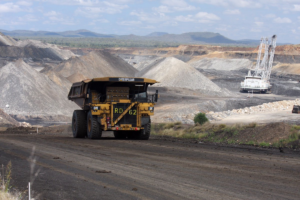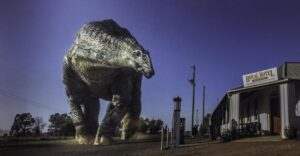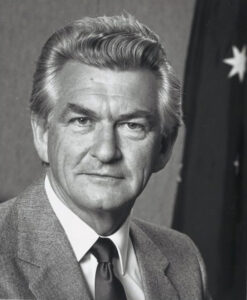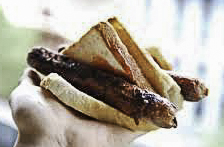I have just been looking at the election results again, and remembering very clearly the backslapping which occurred with the landslide that Bjelke-Petersen effected in the 1974 election in Queensland when the ALP was reduced to 11 seats. At the same time the Queensland Labor Party, the Santamaria-Vince Gair offshoot, was wiped out completely.
The only safe Labor seat left then was Port Curtis or, as it is now named, Gladstone. True to form, in the 2019 swing to the Coalition in the electorate of Flynn, which is a pendulum electorate at the best of times, Gladstone remained Labor as did much of Rockhampton.
Queensland has this history over the past 50 years of being electorally volatile.
However, what intrigued me recently was Blackwater, which is touted as the coal mining capital of Queensland; the coal is exported via rail to Gladstone. The two booths there voted strongly Labor, as did the electors of Bluff down the road where the coal trains interchange in 2019.
The story of Blackwater is instructive – named because of the colour of the water passing across the coal seam. It had a population of 77 in 1966. Then the open cut coalmines came and the population swelled to 10,000 in the 1970s to decline to a current figure of about 4,000. There were about 1,000 voters at the two booths. The majority voted Labor (57 per cent at one booth and 64 per cent at the other). It is also true that other coal towns across the Bowen Basin of Collinsville, Moranbah, Dysart and Tieri all voted for Labor.
Small figures but instructive as a pointer. Given how unreliable the polls are, you might as well attribute the swing in Flynn to the State Government with the duumvirate (or more correctly duamfeminate) of Palaszczuk and Trad, as to the substitution of Morrison for Turnbull. However, quite rightly there was the Longman by-election and subsequently the swing back on May 18, which would point more to the second as the major cause for that phenomenon Nevertheless, change is not always due to one factor.
Flynn has a great many people on the land doing it tough because of the drought, and as you cannot directly blame God, well the State Government may as well cop the blame through its surrogate, Shorten, despite him being the son-in-law of the Queensland Dame, surely a person of renown in her own State.
Blackwater is just one of 40 odd mining centres in the Bowen Basin, which is South of the Galilee Basin.
Admittedly one of difficulties in defining voting patterns in the Bowen Basin is the number of “fly-in-fly-out” (FIFO) mining employees, estimated at 18 per cent of the population. It would be interesting to know the home postcodes of these FIFO miners but the assumption that they are locals, who earn the money that sustains the local economy, needs to be tested if we wish to clearly define the miners’ voting patterns.
Strathmore Furore
I came to Australia as a 14-pound “Pom” on the S.S. Strathmore, a P&O liner. The 14 pounds is an estimate. I might have weighed a pound more or less at four months old, in 1946, when I arrived with my Mum. The ship berthed first at Fremantle.
Somehow the Sydney Daily Telegraph had got wind of stench from our ship. Was the Fremantle Doctor that stiff a breeze to reach Sydney?
The story the paper ran the day after the Strathmore arrived was headlined: alien passengers filthy, ship’s passengers allege. Unbeknown to me for sixty-odd years, around 200 refugees had boarded the ship in Port Said—distressing many of those who, like us, had embarked in Southampton.
A Mr Pugh (“ex-R.A.A.F”) said to the Telegraph: “They are mostly women over 50. “Some,” he added for good measure, “are aged 70”.
That sexism and ageism was just lustre dust to the real thrust of the tabloid’s story: These filthy Germans, Austrians, Czechs, Palestine Jews, Cypriots, Greeks and Maltese were covered in sores and so dirty that the real passengers dare not dip their toes into the same pool.
A Mr Spencer of Regent Motors in Melbourne described the refugees as verminous, pointing out that they refused to be deloused. He demanded, “Why don’t we select our migrants from the magnificent types offering in England, and in Norway, where there are 10,000 ready to come here?”
The Sydney Morning Herald also made news of passengers’ complaints. “They’d turned the ship into a floating ‘Tower of Babel’ (and) wore peasant-type shawls draped about their heads (or) jackets gaily bedecked with patterns worked in silver wire.”
The Herald too handed Messrs Spencer and Pugh a megaphone. Each said in turn:
“The immigrants spat on the decks, threw their fruit peelings everywhere, and hung their washing across the deck promenades. It staggers me that Australia should have to rely for its population on the type of people that this ship brought.”
Sydney’s broadsheet listed just some of the languages spoken in the seagoing Migdal Babel: Hebrew was the first mentioned … then Egyptian, German, Greek, Italian, Polish, Austrian, Hungarian, Yugoslavian (sic) and Czechoslovakian (sic).
The furore ran for several days in newspapers around Australia.
Then the following Friday, The Sydney Morning Herald published a letter from a man called David Hand. He was a passenger on the ship, an Australian, who was also an Anglican priest. His five-paragraph letter was written “purely in the interests of truth and justice”.
The fourth paragraph reads: “As a priest on board, I had occasion to learn a good deal about the moral or immoral behaviour of the passengers; and I know that the highest officers of the ship would support my contention that the morals of the British people were no better – perhaps worse – than those of the ‘aliens’.”
He added in the final paragraph, “Those who were privileged to get to know any of them usually found them friendly, keen to learn Australian ways and language, and full of admiration and gratitude of the British people.”
I must have had my foot tickled by one or two of them because I have always sensed what he means by “privilege”.
ME & my mouse are indebted to John Bevins for this recollection. John was responsible for some of the most potent and innovative social marketing and advertising campaigns from the 1980s to end of the century.
Flynn Addendum – A Message for Albo
This is a tiny parable about the town, which perceived unfairness and bullying.
There was this Tamil couple with their two Australian-born daughters, who were taken from a Queensland town called Biloela in the electorate of Flynn (the majority of which voted 58 per cent for the Coalition). They have been in detention in Melbourne since 2018 under the Dutton aegis, to be deported back to a country where 48,000 Tamils have been killed.

Biloela liked this couple. In fact a petition was raised for them to stay – many people are signing it. The flag over Biloela is not blue. Fifty four per cent of the Biloela citizens voted Labor on May 18. Biloela North admittedly voted 51 per cent Coalition. However, Thangool, 12 kilometres down the road voted 71 per cent Coalition. “Small numbers. Means nothing.” Or perhaps just an example of small town fair play disliking the Big Government the Coalition says it despises and keeps banging on about.
The parable of this story is taken from the Book of Morrison paraphrased: “There is no fair go for those who are forced to go.”
Coal and the Pro-Adani Canavan

Matthew lives in Yeppoon. He has a wife and four children. Yeppoon is a coastal community that is renowned for its beaches, tropical climate, and the islands out on the bay. So says Wikipedia. It is where people who can afford not to live in Rockhampton go. Rockhampton is on the Fitzroy River far from the coast. It is not the place in which to spend summer. Yeppoon is better.
Yeppoon does not have a coalmine. Matthew has a younger brother called John. John likes coalmines. In fact he has been reported as keen to acquire the Rolleston mines, which were surplus to need for Glencore. John and Matthew seem to regularly communicate about their love for coal.
In a cuddly meal at the “Brekky Creek” Hotel in 2017 with the AFR, Matthew’s position was described thus: “The senator has become an avid reader of mining history and uses it to justify his position to use taxpayer funding to back Adani’s controversial mine, saying a leg-up from taxpayers helped get all new mining regions off the ground, evoking the “if you build it they will come” attitude of the Bjelke-Petersen era.”
Now I live around the corner from where there was once a coal mine, next to the primary school. The two mineshafts, Birthday and Jubilee, were sunk in 1897, and named for the 60th year of the Victorian reign. In fact my late neighbour as a boy used to dart round the corner to get lumps of coal from the dump for the family fire. He would brandish them triumphantly as he scooted home. Lots of soot in the air but it was only where the working class lived.
Matthew would be proud of how the then NSW Government offered to assist the viability of the coal mine when eventually after 30 years it was shown to be uneconomic, but in his terms needing “a leg-up.”
Oh, it was so picturesque, Matthew. Undercapitalised, the mine was never mechanised; so there were pit ponies lowered every morning to work in the mine’s narrow shafts. There were 159 men on the day shift, and the atmosphere was dusty with the temperature reaching 38 degrees C. Miners had a short life.
It is impossible to reconcile why any Australian government would tolerate such a situation, but during this time it was mostly a Labor seat with the then H.V. Evatt being one of the members for the Balmain seat when the miners were working under such appalling conditions. So much for his occupational health credentials!
But I digress. Even as late as the mid-eighties there were discussions about using the mine for gas supplies, and I remember that the opening to the mineshaft was still visible at that time.
Incidentally the remediation process for the mine took decades, including the death of three workers in an explosion of methane gas. To make the mine safe after that tragedy needed four million gallons of water – not sea water, fresh water – to get rid of the coal gas. Note water usage, Matthew.
As a student of mining history, I am sure Matthew would like to know the original stakeholders for the Balmain mine lived nowhere near Balmain. A bit like Adani, but more Old World. London to be exact.
And Matthew, somebody always has to pay the Piper … maybe your children and our grandchildren.
Hawke in the Willow
When I was seriously involved in politics, I met Bob Hawke once when he was Prime Minister and was very impressed and flattered that he knew who I was. He was one of those politicians who knew both faces and reputations. He was on a different rail line to me.
However, one night years later my wife and I with a few friends were celebrating our ninth wedding anniversary. Now the ninth wedding anniversary is willow for all of those who are not obsessed in knowing what to give on a particular anniversary. Needless to say, I had just presented my wife with a cricket bat at the celebratory festivity in the Flower Drum restaurant in Melbourne, when in walks Bob and Blanche with a few friends, including the late Martin Crowe, then recently retired after captaining the New Zealand cricket team.
Given that the last time Hawke had greeted me like a mate, and with a reasonably high sherbet level I took the cricket bat over to them after they had settled in but before any of that elegant Flower Drum Chinese tucker had started to flow. I asked Bob as a mate to sign the bat for my wife giving him a potted history of why I had a cricket bat in a posh Chinese restaurant. He obliged. Blanche signed too. Hawke however looked at me quizzically given that it was a unique experience to be asked to autograph a cricket bat in such an environment. However, that was the personal touch of the man.
Then as I thanked them and was walking back to our table, the owner of the restaurant insisted on signing it too.
As we were walking down Little Bourke Street after dinner, my wife had the cricket bat over her shoulder, and somebody in the street yelled out, “Melbourne is not that dangerous, luv.”
Mouse Whisper
Heard in the Manolo Blahnik industrial boot store in Paraburdoo.
“So if blue is Liberal and red is Labor, when they come together in the political centre do they mix to form purple? The Political centre must be called the Purple Patch then.”
By the way, just back from Mousehole where the last Cornish speaker, Dolly Penteath died in 1777. Her last words were defiant. “Me ne vidn cewswel Sowsnek” – “I don’t want to speak to English”.







